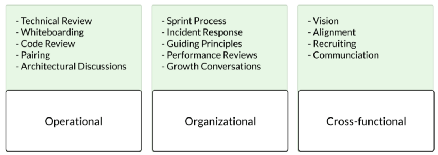今日推荐开源项目:《解决数据问题 bad-data-guide》
今日推荐英文原文:《The 3 Capacities of a Good Manager》

今日推荐开源项目:《解决数据问题 bad-data-guide》传送门:GitHub链接
推荐理由:在处理数据时容易遇上的一些问题——比如一年数据除以十二得出每月数据这样的,要知道这十二个月里有冬夏之分等等各种差别,而兴许其中一种正影响着手头上的数据。这个项目介绍了处理数据的一些需要知道的小技巧,不需要太多的统计学知识也能避开一些常见的错误。
今日推荐英文原文:《The 3 Capacities of a Good Manager》作者:Matthew Werner
原文链接:https://medium.com/better-programming/the-3-capacities-of-a-good-manager-a950e798aaaa
推荐理由:不仅是编码能力,管理团队的能力一样不可或缺
The 3 Capacities of a Good Manager
A framework to help you be there for your team

Photo by Startup Stock Photos on Pexels
I recently had a friend lament to me about the stresses at her work brought about by her manager. Let’s call him Josh.
Josh is highly respected where my friend works. He’s great to have in whiteboarding sessions, he seems to always come up with clever solutions, and on top of that, he’s not afraid to roll up his sleeves and jump into the code.
At first, my friend was excited to work with Josh. He’s super talented and very experienced, and so she felt like she could learn a lot. However, after spending a while on the team, she noticed the time between whiteboarding sessions could be pretty stressful, including things like:
- Unplanned work regularly shows up mid-sprint, oftentimes loaded with urgency right before another team’s deadline.
- Pager-duty rotation is notoriously painful. Sometimes you can’t even find the person that owns the code that broke.
- She feels like she’s always doing interviews, but hasn’t seen anyone new join to help add bandwidth.
- It kind of feels like she’s going from performance review to performance review, not really knowing what she’s working toward.
- Twice last quarter, one of the projects her team was working on got cut or had a minor MVP rollout before the team moved on.
She really enjoyed the content of the work she was doing, but in the end, she asked to be transferred to a different team to have a more sane day-to-day.
The Traits of Good Managers
Even though Josh is adding tons of value when he’s working with the team on a tough problem, the members of the team are stressed and want to leave. There’s more to management than technical excellence. The technical ability forms a foundation to build on top of, but it isn’t sufficient in and of itself. Good managers need capacity in three separate domains:- Operational
- Organizational
- Cross-functional
Some responsibilities will come more naturally than others. At the very least, you need to know where your strengths and weaknesses are, or you’ll have people leaving your team. Let’s go over each of the capacities in more detail to better understand how they cover the distinct concerns of being a manager.
There’s More to Management Than Expertise
Operational work is a manager’s ability to weigh in on technical conversations, review code, or help ensure a rigorous technical process is being followed on a project. For non-technical work, it’s the subject matter of the individual contributors you need to be familiar with. This is an important basis for the manager to work from, but it shouldn’t be the primary way in which you’re helping the team succeed.There are a few problems that come about when a manager regularly swoops in on their team to finish a project:
- Ownership is usurped from the ICs and slows their growth and learning.
- The manager’s time won’t scale with the team’s work.
- The manager’s other responsibilities are neglected (one on ones, quarterly planning, etc.).
- It overworks the manager, often blocking progress on the project.
Josh had this view of management. Before he was a manager, Josh’s performance was evaluated based on the quality and speed of his contributions. Josh is neglecting the majority of his responsibilities as a manager by continuing to prioritize the domain of operational work. This happens most often when a deadline is approaching and the stresses of making sure his team ships in time convinces him he needs to take over.
Support the project, don’t drive it
For a manager, operational work is really about facilitating the technical work on your team. Technical knowledge is required to be able to do this, but the focus should be on making the people on your team more capable. That way, you can focus your attention on other responsibilities.Finding the balance can be challenging, especially when those driving the project are making decisions differently than you had expected. Some good examples of involvement include:
- Trust your team to make significant decisions. Instead of deciding for them, challenge them to defend their choices. When they can do so, support their direction.
- Identify edge cases during whiteboarding sessions. As soon as everyone feels good on the direction of the discussion, challenge them to consider a different possibility. This will help them solidify their current view of the problem.
- Don’t insert yourself to the critical path. If you are required to commit some code or sign off on something, you become a single point of failure. Instead, work with your team earlier in the process to be sure you’re aligned.
- After a project is over, check in with the owners to discuss how things went. Go over what went well in just as much detail as what can be improved for next time. This isn’t to create accountability — it’s to foster individual growth.
It’s a great feeling when you see one of your team members guiding another in the same way you had guided them on a previous project.
Crafting Your Organization
Organizational work is any work that crafts the culture of your team. It’s very easy to overlook this sort of work. Or, if you’re on the fence about management, you may roll your eyes when you hear things like “sprint process” or “performance review.”First-time managers can find organizational work the most awkward or unpleasant in their transition. It’s easy to overlook or to put off. Organizational work is an investment in your team’s ability to function. Without it, you see a variety of symptoms:
- Inconsistent quality and shipment process when delivering a project.
- Unclear ownership or escalation process when dealing with bugs or incidents.
- Differing views within members of the team. Do we move fast and break things or move diligently and fix things?
- Fear of speaking up, whether it be in a meeting or to your manager.

Photo by Binyamin Mellish on Pexels
Organizational work can also be some of the most fun a new manager can have. It’s the first opportunity to make decisions that have a bearing on the way your team works. Planting these seeds on your team is some of the highest leverage work you can pursue. It also produces a much more resilient and exciting environment for people to work in. Some of the work includes:
- Setting up a pragmatic and effective sprint process.
- Establishing an incident process, including retrospectives.
- Working with individuals on your team to help them grow in their career.
- Running performance reviews that help you candidly check in with people on your team.
An example of organizational work: sprint reviews
If your team isn’t currently holding sprint reviews, your first work is to set those meetings up. Changing process on a team can be tricky, so you’ll need to clearly communicate what the change is and why you’re doing it. Also, make sure everyone is on board with the change. I call this winning the hearts and minds of your reports. The last thing you want is a meeting no one really cares about and doesn’t participate in. Then, you’re just wasting everyone’s time.In the sprint review, you want an environment where people can speak freely and openly about the things that went well or could have gone better. It needs to be a safe space that is free from any kind of judgment or retribution. This means, especially the first few times you hold the meeting, you need to foster that environment and keep things relaxed. It’s also a good idea to take notes as a group of what everyone is saying. This will allow folks on the team to share what’s really going on and feel heard by their coworkers.
After the sprint retrospective, you now have a list of all the things that are important to your team. Congratulate and recognize any accomplishments and address any problems or concerns. The organizational work of addressing problems raised in sprint review is one of the highest leverage ways to directly make your reports’ lives better.
This is a significant amount of work, over several weeks, to get to a place where you can solicit feedback from your team and act on it to improve their experience and make them more productive. This work isn’t technical, but it’s entirely possible you’re adding more value here than if you prioritized technical involvement over setting this up.
The most compelling part of organizational work is if you think this approach to sprint reviews is dumb, you can run yours in a totally different way, or not at all. The organizational work you do crafts the culture of your team. It’s important to respect organizational work; if you don’t put much thought into it, you may not know what your team’s culture will turn out to be.
Succeeding With Others
Cross-functional work is any work that requires the manager to be a liaison to stakeholders outside the team. This domain is often the most challenging because it involves stakeholders that aren’t within the reporting structure of the team. This means they have their own agendas, constraints, and goals. As the team’s manager, you need to make sure your team is on the same page with what other teams are doing. You also have to make sure your team is meeting expectations.
Photo by Pixabay on Pexels
Identifying cross-functional work is challenging and often only apparent when you feel symptoms of a problem. Knowing your customers and where friction is being felt is the best starting point for understanding what cross-functional work is required for your role.
You’ll notice symptoms like:
- Last second details of a project prevent it from shipping on time because it won’t line up with another team’s work.
- Your engineers are spending a lot of time nailing down the scope or requirements of a project.
- The various projects your team is working on seem unrelated to a shared direction or company strategy.
- Other teams aren’t aware of what your team works on or why it’s important.
- You have a hard time convincing people to join your team or understand how your team fits in with the company.
The way you handle such a complex domain is through diligent and consistent effort toward a common goal. I had a product manager that did this best. He scheduled sitdown conversations with every team we interacted with, asked them what else they were looking for, and read them back everything they said at the end. We stated clearly what we could or couldn’t do and we were able to move forward cross-functionally.
It’s difficult to know if you’re working well cross-functionally — you can only tell if you’re doing poorly. It’s the kind of thing that isn’t a problem at all until it’s a big one. However, there are some habits that can help you get going in the right direction:
- Routinely check in and talk with external stakeholders. You should have a good enough relationship with them that when a random consideration comes up that might impact you, they think of letting you know.
- Communicate new information multiple times over multiple channels (Slack, in person, email, etc.). It feels strange repeating yourself, but it needs to happen if you really want to get everyone on the same page.
- Have a good understanding of what you expect your team will be working on in a year’s time. Be completely comfortable with that changing along the way.
- Get into the habit of communicating concerns to select external stakeholders well ahead of time. This helps align their groups and mitigate last-second urgency. Think of it as a “Road Work Ahead” sign that helps cars on the highway slow down, rather than suddenly slamming on the brakes.
Knowing Your Strengths, Expanding Your Capacity
No manager is perfect in every capacity. Some leaders are compelling visionaries, but can’t speak to the “how” that well. Others are heads-down “do-ers” that don’t have much stomach for fine-tuning their team’s process.
Some examples of the three capacities
Understanding what you do well and where your gaps are can go a long ways toward building a resilient team. You can take measures to cover the things you know you aren’t as good at and double down on where you excel as a manager.
The important thing is that you understand the needs of your team, and how your participation as a manger improves or hinders their ability to do great work.
下载开源日报APP:https://openingsource.org/2579/
加入我们:https://openingsource.org/about/join/
关注我们:https://openingsource.org/about/love/
